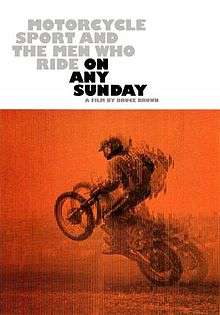On Any Sunday
| On Any Sunday | |
|---|---|
 | |
| Directed by | Bruce Brown |
| Produced by |
Bruce Brown Steve McQueen |
| Starring |
Bruce Brown (narrator) Steve McQueen Mert Lawwill Malcolm Smith Paul Carruthers |
| Music by | Dominic Frontiere |
| Cinematography | Robert E. Collin |
| Edited by |
Bruce Brown Brian King |
Release dates |
|
Running time | 96 minutes |
| Country | United States |
| Language | English |
On Any Sunday is a 1971 American documentary film about motorcycle sport, directed by Bruce Brown. It was nominated for a 1972 Academy Award for Documentary Feature.[1]
This documentary follows the lives of motorcycle racers and racing enthusiasts. Brown tried to show the unique talents needed for the different forms of racing. For instance, the motocross riders were typically free-spirited types, while desert racers were often loners. In Grand National racing, Brown showed the differing personalities, such as the business-like approach to racing displayed by Mert Lawwill versus the carefree approach that wild young rookie David Aldana became known for.[2]
Steve McQueen is featured in the film, along with Mert Lawwill, Malcolm Smith and many other motorcycle racers from the late 1960s and early 1970s.
From a historical perspective, the motorcycles featured in the film include Triumph, Husqvarna, Harley Davidson, Honda, Yamaha, Suzuki, and other manufacturers that are still in business or gone by the wayside such as BSA, Bultaco, and Hodaka.
Production
The film was financially backed, in part, by Steve McQueen[3] through his "Solar Productions company", which received credit in the final seconds of the film.
Bruce Brown on filming method: "At times I’d have a particular shot in mind. For example, I wanted to shoot a muddy motocross race and show the riders with mud all over them. First you have to be at a motocross race when it rains, then you have to find a good location to shoot. We tried and tried to get a shot with a rider caked with mud. We finally did get the shot, but for a while it seemed like we never would."
Some of the most dramatic shots of the movie were the extreme closeup slow-motion segments of the Grand National races. From his surfing movie days, Brown was used to working with super telephoto lenses. The budget didn’t allow the expense of high-speed cameras, so Brown improvised by using 24-volt batteries in the 12-volt film cameras. The result was a makeshift high-speed camera. Brown also used a helmet camera on some of the riders, one of the first times something like that had been attempted. This was before the days of miniature cameras and the set-up was often quite bulky on the rider’s helmet.
At one point, Bruce Brown found a perfect location for a sunset beach riding shot—Marine Corps Base Camp Pendleton.
"I figured there would be no way to get approval to film on the Marine base," Brown recalls. "Steve McQueen said he’d see what he could find out. The next day he called and was told to contact some General and the next thing you know we are shooting the beach sequences. It was pretty amazing the doors he was able to open."[2]
Steve McQueen was a former Marine so that helped. This beach scene is used for the final scenes of the film with Brown filming McQueen, Lawwill, and Smith riding in the setting sun.
Critical reception
On Any Sunday is often credited as the best and/or most important motorcycle documentary ever made."[4] Roger Ebert says it "does for motorcycle racing what The Endless Summer did for surfing". Ebert praises the film's high level of artistry in accomplishing the impressive footage of motorcycle races (which he says are difficult to film), and he also credits the film for not bothering viewers with the technical details of how the filming was done.[3]
Impact
During the opening sequence, children are seen riding their bicycles on a dirt track, in imitation of motorcyclists. Thanks to this scene, On Any Sunday is thought to have popularized BMX biking across America; previously it had only been observed in Southern California.[5]
"I think many people changed their minds about motorcyclists after watching the movie," Brown said. "One particularly funny story was told by Mert Lawwill. Being a motorcycle racer he was sort of considered the Black Sheep of the family. The old matriarch of the family, Lawwill’s grandmother-in-law, went to see the movie and in the middle of one of the scenes featuring Lawwill she stood up and shouted, 'That’s my grandson!' Suddenly he was the big hero of the family."[2]
Malcolm Smith, who was also a major focus of the film, credits "On Any Sunday" with giving him the worldwide recognition that enabled him to become a leading entrepreneur in the off-road motorcycling business.[2]
Several follow-ups to the film were produced:
- On Any Sunday II (1981), starring Bob Hannah and Larry Huffman
- On Any Sunday: Revisited (2000), by Dana Brown
- On Any Sunday: Motocross, Malcolm, & More (2001), by Dana Brown
- On Any Sunday, The Next Chapter (2014), by Dana Brown
References
- ↑ "NY Times: On Any Sunday". NY Times. Retrieved 2008-11-12.
- 1 2 3 4 "On Any Sunday". Bruce Brown Films, LLC. Archived from the original on 2013-01-21.
- 1 2 Ebert, Roger (1971-08-03). "On Any Sunday". Chicago Sun-Times.
- ↑ Joe. "The Top 5 'Must-Watch' Motorcycle Movies". www.mc-ams.co.uk.
- ↑ Rompella, Natalie (2007). Famous Firsts. Lobster Press. p. 34. ISBN 1-897073-55-0.